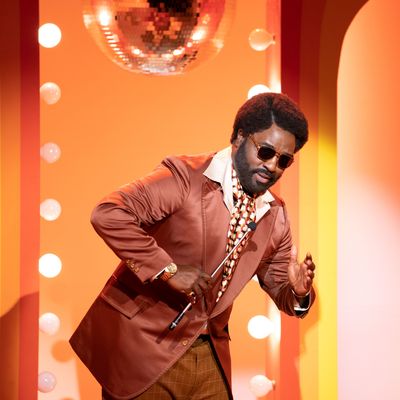
Clever, laid-back, and sneakily weird, the new IFC series Sherman’s Showcase will be catnip to pop-culture-history obsessives, the kind of viewers who might look at a lavishly executed scene from a 1970s TV series or talk show that never existed, and appreciate that the filmmakers got not just the historical and design references right, but the circumference of the Afros as well. It’s a glittering heap of invention that moves according to its own internal logic. There are fragments of made-up movies, documentaries, talk shows, public-affairs programs, and ads, plus extended, intricately choreographed musical performances by acts that the show invented from whole (polyester) cloth. One 1980s episode is “brought to you by VHS, the future of film!” and another gives a history of the show’s robot backup dancer, Funkatron 2000, which in the 1980s was connected to ARPANET and voted for Ronald Reagan.
Created by actor-writers Bashir Salahuddin and Diallo Riddle, and presented as an extended infomercial for a 23-disc commemorative DVD set, the show stars Salahuddin as Sherman McDaniels, a seemingly ageless performer, interviewer, and impresario whose scandal-ridden past is often elided or skipped over by the show’s assorted “expert witnesses” (including John Legend, who serves as host of the first episode). McDaniels’s career mixes elements of Ed Sullivan, Tom Snyder, and Don Cornelius, and as the series’s eight episodes play out, we get a fragmented history of his signature accomplishment, Sherman’s Corner. Premiering on a local Glendale UHF station in 1974, Sherman’s Corner ran for 40 years, showcasing everything you can imagine, including (or so we’re told) erotica and live executions, and making stars of performers like Jackie Redmond, Rufus, and the JBs, and turning its regular lineup of backup dancers into household names. The cultural legacy presented here is so rich that casual viewers might rush to Wikipedia to look up the unfamiliar “big” names, like James Brown soundalike Jackie Redmond; the Sherman’s Showcase backup dancers, including Barnabas T. Grind, Billy Jack Hebrew, Nefertiti Spencer, and the Human Crayon; and Sherman’s father, “the only openly African-American Foley artist” and the writer of numerous screenplays, including 1946’s Hotel Dunbar, directed by Oscar Micheaux.
But there’s more going on here than a sketch-comedy nostalgia trip. Superficially, Sherman’s Showcase seems like another entry in a comedy continuum of faux-history that includes The Rutles, Zelig, Forrest Gump, and IFC’s own Documentary Now! But what makes this series stand out is how it weaves in a utopian fantasy element. Its invented gallery of African-American entertainers are contextualized as part of a thriving black culture that’s obviously part of the mainstream, not operating adjacent to it, or struggling to claim a little corner.
In one episode, we get a bit of alternate history delivered via a black-and-white 1940s newsreel called Black Hollywood News, something the white-dominated entertainment industry in a segregated nation never would have permitted. Ditto Sherman’s Song Parade of Colored Music, a 1950s variety series hosted by Sherman’s father that apparently ran on a major broadcast network and featured only black performers. There’s even an alternate version of Orson Welles’s legendary radio drama version of War of the Worlds, which terrified American listeners in 1939 by making them think Martians had actually landed in the United States; but in this version, the threat is African-Americans taking over Los Angeles, not through violence, but simply by living as white folks would. (“Negroes with knives and forks and spoons are dining at the Brown Derby!”)
The series would make for a fascinating double feature with Kevin Willmott’s excellent 2004 faux-documentary C.S.A.: Confederate States of America, which imagines an alternate timeline in which the North lost the U.S. Civil War. This alteration of one outcome changes everything about modern North American life, not just in terms of everyday race relations (things are even more brutal, obviously) but culture (Elvis Presley flees to Canada to avoid persecution for performing black music). But the counterfactual comedy is much lighter here because Sherman’s Showcase imagines an alternate timeline where life in the United States was better for people of color, not worse, and there are audio and video records to remind people of the splendors of the past while they appreciate the richness of the present.


